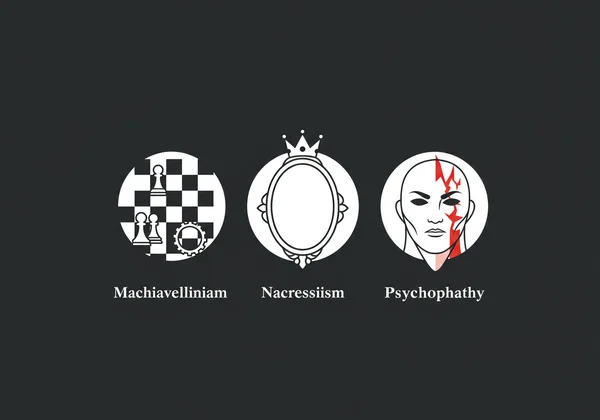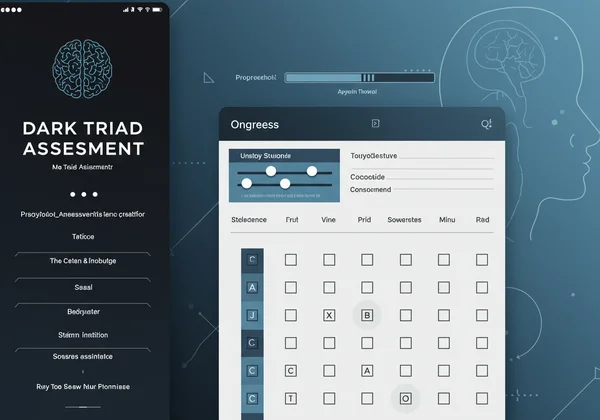Am I Dark Triad? Signs, Behaviors & Self-Assessment Guide
July 27, 2025 | By Julian Vance
Have you ever found yourself questioning certain behavioral patterns, either in yourself or in someone you know? It's a common journey of self-reflection that leads many to ask, How do I know if I am dark triad? This question isn't about seeking a label, but about gaining clarity. If you're looking to understand the complex interplay of manipulation, entitlement, and a lack of empathy, you're in the right place. This guide explores the common signs and behaviors associated with the Dark Triad traits, serving as an initial educational tool for self-discovery. For a truly personalized insight into your unique profile, a structured dark triad test offers the next crucial step.
This guide serves as an educational tool for self-discovery. We'll break down the tendencies associated with Machiavellianism, Narcissism, and Psychopathy in an objective, non-judgmental way. Understanding these concepts is the first step toward greater self-awareness and personal growth. For a comprehensive look at your unique personality profile, you can always take the test on our homepage.
Understanding the Dark Triad Traits: A Brief Overview
Before we dive into specific behaviors, it's essential to grasp what the Dark Triad is—and what it isn't. It's not a clinical diagnosis but a psychological framework used to understand a set of three distinct yet overlapping personality traits. Think of these traits as existing on a spectrum; everyone possesses them to some degree. A higher score simply indicates a stronger tendency toward these behaviors.
What is the Dark Triad? Defining the Core Traits
The "Dark Triad" was first identified by researchers Delroy L. Paulhus and Kevin M. Williams in 2002. It comprises three subclinical personality traits:
- Machiavellianism: Characterized by a strategic, manipulative, and cynical view of others. Individuals high in this trait see people as means to an end.
- Narcissism: Defined by grandiosity, a sense of entitlement, and a constant need for admiration and validation from others.
- Psychopathy: Marked by high impulsivity, thrill-seeking behavior, and a significant lack of empathy and remorse.
Understanding these foundational concepts is key to interpreting the behaviors we'll discuss. For a detailed evaluation of where you might fall on each spectrum, a free dark triad test can provide a structured assessment.

The Interplay of Machiavellianism, Narcissism, and Psychopathy
While distinct, these three traits often work in concert. A person might use the superficial charm associated with psychopathy to fuel their narcissistic need for attention, while employing Machiavellian strategies to achieve their goals. The common thread that ties them together is a self-centered approach to life and interpersonal relationships. Recognizing how these traits can blend and manifest is crucial for a complete understanding of the personality profile.
Signs of Machiavellianism: The Master Strategist
Individuals with strong Machiavellian tendencies are often described as master strategists or puppeteers. They view the world as a chessboard and other people as pieces to be moved for their own advantage. Their actions are rarely spontaneous; instead, they are carefully calculated to achieve a specific outcome. This is a core component evaluated in any legitimate machiavellianism test.
Strategic Manipulation & Deceit in Everyday Interactions
A key sign of Machiavellianism is the consistent use of manipulation to get what one wants. This isn't always overt or aggressive. It can be subtle, involving flattery, feigning interest, or strategically withholding information to maintain an upper hand. They are pragmatists to the core, believing that the ends justify the means, even if it involves deceit.
Emotional Detachment and Calculated Decisions
Another hallmark is a profound emotional detachment. Individuals high in Machiavellianism can make cold, calculated decisions without being swayed by sentiment or the feelings of others. This allows them to remain focused on long-term goals and pursue them with a singular, unwavering focus. They prioritize logic and self-interest over emotional connection.

Narcissistic Behaviors: The Pursuit of Admiration
Narcissism is perhaps the most widely discussed of the three traits. While a healthy level of self-esteem is beneficial, narcissistic behaviors are rooted in an inflated and often fragile sense of self-importance. A narcissism test measures the extent of these self-aggrandizing tendencies.
Grandiosity, Entitlement, and a Need for Adoration
The most visible sign of narcissism is a grandiose sense of self. This manifests as a belief that one is special, superior, and deserving of praise and preferential treatment. This sense of entitlement often leads to frustration or anger when their perceived status isn't recognized by others. They thrive on admiration and will often dominate conversations to steer the focus back to themselves and their accomplishments.
Fragile Self-Esteem Beneath the Surface
Interestingly, this outward projection of superiority often masks a deeply fragile self-esteem. Individuals with strong narcissistic traits can be hypersensitive to criticism, viewing any challenge as a personal attack. Their constant need for validation is a way to prop up their shaky sense of self-worth. This internal dynamic is a crucial part of their psychological makeup.
Psychopathic Tendencies: A Lack of Empathy and Impulse Control
Psychopathy in the Dark Triad context refers to subclinical traits, not a clinical diagnosis of Antisocial Personality Disorder. It involves a core deficit in empathy and emotional processing, coupled with impulsive and thrill-seeking behavior. A psychopathy test helps identify these tendencies.
Superficial Charm and Callousness
Individuals with psychopathic traits can be surprisingly charming and engaging at first. This superficial charm, however, is a tool used to disarm others and build unearned trust. Underneath this veneer lies a callous disregard for the feelings, rights, and safety of others. They often fail to form genuine emotional bonds, viewing relationships in a transactional way.
Risk-Taking and Impulsive Actions
A strong tendency toward impulsivity and risk-taking is another key sign. This can manifest as a constant search for novelty and excitement, often without considering the potential consequences for themselves or others. They may struggle with boredom and act on a whim, seeking immediate gratification over long-term stability. If this sounds familiar, it might be worth it to start your assessment.
Beyond the Individual Traits: How Do Dark Triad Behaviors Manifest Together?
Understanding the individual traits is one thing, but their combined effect creates a unique behavioral pattern. How do dark triad people act in real-world scenarios? The answer lies in their approach to relationships and goals, which is often exploitative and self-serving.
Common Interpersonal Patterns & Relationship Dynamics
In relationships, a person with high Dark Triad traits may initially be captivating and intense. However, over time, their lack of empathy, need for control, and manipulative tendencies often create toxic and unstable dynamics. They may exploit partners for resources, validation, or excitement, and then discard them when they are no longer useful. Their relationships are often characterized by drama, conflict, and emotional manipulation.
Self-Reflection Questions: A Deeper Look
Reading about these signs is a start, but self-reflection is where true insight begins. Consider these questions honestly:
- Do I find myself flattering people to get them to do what I want?
- When faced with a decision, do I prioritize the logical outcome over how it will make others feel?
- Does criticism feel like a personal attack, even when it's constructive?
- Do I get bored easily and find myself seeking out risky or thrilling situations?
- Do I view my relationships primarily in terms of what I can gain from them?
Answering these questions can be revealing. For a more objective measure, a scientifically-backed assessment can provide the clarity you're seeking. Uncover your profile today to learn more.

Ready for Deeper Insights? Take Your Dark Triad Assessment
This exploration of Dark Triad signs and behaviors serves as a powerful act of self-discovery. This guide provides a framework for understanding these complex traits, from the strategic mind of Machiavellianism to the self-love of Narcissism and the impulsivity of Psychopathy. Recognizing these patterns in yourself or others is the first step toward managing them for personal growth and healthier relationships.
While self-reflection is invaluable, a comprehensive and confidential dark triad test offers objective, data-driven insights. Our test is designed as a tool for awareness, not diagnosis. It provides a secure way to measure your tendencies and offers an optional, AI-powered deep analysis to transform your results into actionable steps for personal development.
Ready to move beyond questioning and toward clarity? Discover your results and begin your journey of self-awareness today.

Frequently Asked Questions About Dark Triad Traits
How do dark triad people act?
Individuals high in Dark Triad traits tend to be self-centered, manipulative, and emotionally detached. They may appear charming and confident on the surface but often engage in strategic behavior to achieve their goals, regardless of the impact on others. Their actions are driven by a need for power, admiration, and personal gain.
Can dark triad be cured?
"Cure" isn't the right term, as these are personality traits, not illnesses. However, individuals can learn to manage their tendencies. Through self-awareness, therapy (like Cognitive Behavioral Therapy), and a conscious effort to develop empathy and prosocial behaviors, people can mitigate the negative impact of these traits on their lives and relationships. The first step is awareness, which is what a tool like our dark triad personality test provides.
What professions have the Dark Triad trait?
Certain professions may attract or reward individuals with Dark Triad traits. High-stakes environments where assertiveness, emotional detachment, and strategic thinking are valued can be a draw. These may include roles in leadership (CEO), law, surgery, sales, and media. However, these traits are not a prerequisite for success in any field.
What is Machiavellianism vs narcissism?
While both are self-serving, their core motivation differs. Machiavellianism is primarily driven by a cynical, pragmatic desire for power and control, using manipulation as a tool. Narcissism is driven by a need for admiration and validation to support a fragile, grandiose ego. A narcissist wants to be admired, while a Machiavellian wants to win.
Disclaimer: This article is for educational and informational purposes only. It is not a substitute for professional psychological advice, diagnosis, or treatment. The test offered on this site is a tool for self-exploration and not a clinical diagnosis.